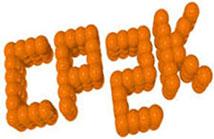Our main research tool in the Siepmann Group is the MCCCS‒MN (Monte Carlo for Complex Chemical Systems‒Minnesota) software that is under constant development. MCCCS‒MN allows for the simulation of multi-component molecular systems in the canonical, isobaric-isothermal, grand-canonical, semi-grand, and Gibbs ensembles. It uses the configurational-bias Monte Carlo method to efficiently sample phase space for linear, branched and cyclic chain molecules, the adiabatic nuclear and electronic sampling Monte Carlo method to treat many-body polarization effects, and the aggregation-volume-bias Monte Carlo algorithm to efficiently sample the spatial distribution of associating molecules.
Funding for the development of MCCCS-MN through grants from the National Science Foundation (simulation of fluid phase equilibria) and the Department of Energy (simulation of adsorption equilibria and high-throughput workflows) is gratefully acknowledged.
Specific Downloads:
MCCCS‒MN is available via a GNU general public license. Specific versions of MCCCS‒MN used for a given publication are made available as part of the Supporting Information of publications:
Y. Sun, R.F. DeJaco, and J.I. Siepmann, "Deep neural network learning of complex binary sorption equilibria from molecular simulation data," Chem. Sci. 10, 4377–4388 (2019). DOI: 10.1039/C8SC05340E
T.R. Josephson, R. Singh, M.S. Minkara, and J.I. Siepmann, "Partial molar properties from molecular simulation using multiple linear regression," Mol. Phys., online (2019). DOI: 10.1080/00268976.2019.1648898
MCCCS-Towhee:
A user-friendly version of this software (MCCCS‒Towhee), which implements the TraPPE force field along with several other common force fields, is maintained by Marcus G. Martin. It is available via a GNU general public license and can be downloaded from towhee.sourceforge.net
CP2K is a free, open-source quantum chemistry software package designed to perform molecular dynamics and Monte Carlo simulations of clusters and periodic systems. CP2K can be run in both MPI and OpenMP modes, and built-in farming procedures allow for capacity jobs at DOE Leadership Computing Facilities. The Siepmann group contributes to CP2K through the development of first principles Monte Carlo (FPMC) modules and associated workflows for simulations of phase, adsorption, and chemical equilibria.
Funding for the Siepmann group’s development of modules for CP2Kthrough grants from the Department of Energy (DE-FG02-12ER16362 and DE-FG02-17ER16362 for FPMC simulations of adsorption equilibria; Lawrence Livermore National Laboratory for FPMC simulations in the canonical and isobaric-isothermal ensembles) and the National Science Foundation (FPMC simulations of vapor-liquid equilibria and of reaction equilibria) is gratefully acknowledged.
Specific Downloads:
A modified version of CP2K with modifications for reactive first principles Monte Carlo (RxFPMC) simulations can be downloaded here: https://github.com/eofetis/cp2k/tree/atom-switch
More information on RxFPMC can be found in the following publications:
E.O. Fetisov, M.S. Shah, C. Knight, M. Tsapatsis, and J.I. Siepmann, "Understanding the reactive adsorption of H2S and CO2 in sodium-exchanged zeolites," ChemPhysChem 19, 512-518 (2018). DOI: 10.1002/cphc.201700993
E.O. Fetisov, I-F.W. Kuo, C. Knight, J. VandeVondele, T. Van Voorhis, and J.I. Siepmann, "First-principles Monte Carlo simulations of reaction equilibria in compressed vapors," ACS Central Science 2, 409-415 (2016). DOI: 10.1021/acscentsci.6b00095
Generic Download:
CP2K can be downloaded from www.cp2k.org

